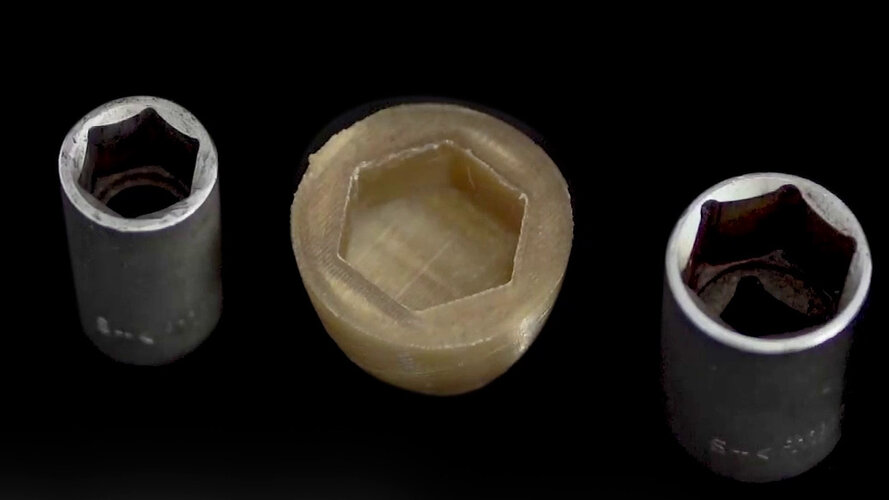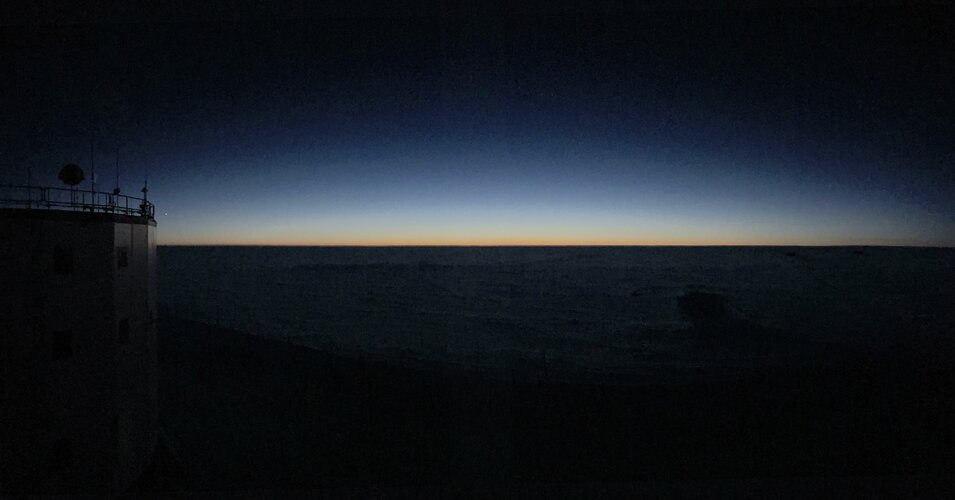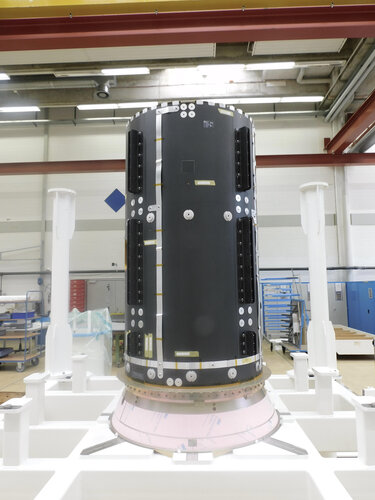
Copernical Team
Thursday, 10 March 2022 12:00
IMPERIAL: 3D printing’s new dimension
 Video:
00:02:30
Video:
00:02:30
ESA’s new IMPERIAL 3D printer can print parts much larger than itself, overcoming one of the main constraints of the process – limited build volume.
What is also known as ‘Additive manufacturing’ is an essential enabling technology for deep space crewed missions. Accordingly this printer has been specially designed with ‘out-of-Earth’ manufacturing in mind, enabling future space explorers to produce structures, tools and spare parts as needed. Built to operate in weightlessness – meaning it can work upside down on Earth – the printer is capable of printing high performance polymer parts of unlimited dimensions along a single direction.
Published in
News
Tagged under
Thursday, 10 March 2022 14:28
The long goodbye
 Image:
The long goodbye
Image:
The long goodbye
Published in
News
Tagged under
Thursday, 10 March 2022 08:03
Backbone of Hera asteroid mission
 Image:
Backbone of Hera asteroid mission
Image:
Backbone of Hera asteroid mission
Published in
News
Tagged under
Thursday, 10 March 2022 06:59
Expedition to highest active volcano unearths clues about life on other worlds
Boulder CO (SPX) Mar 09, 2022
 A harsh sun shines down through a cloudless sky, across a vast and unforgiving landscape. It's covered in gray rock, giant ice sculptures and expansive fields of spiky, yellow and orange bushes. In the distance, intimidating mountain peaks dominate the desolate scene, many miles from the nearest town. Yet alpacas roam freely and flamingos seek out scarce water, both unexpected sights in this wil
A harsh sun shines down through a cloudless sky, across a vast and unforgiving landscape. It's covered in gray rock, giant ice sculptures and expansive fields of spiky, yellow and orange bushes. In the distance, intimidating mountain peaks dominate the desolate scene, many miles from the nearest town. Yet alpacas roam freely and flamingos seek out scarce water, both unexpected sights in this wil
 A harsh sun shines down through a cloudless sky, across a vast and unforgiving landscape. It's covered in gray rock, giant ice sculptures and expansive fields of spiky, yellow and orange bushes. In the distance, intimidating mountain peaks dominate the desolate scene, many miles from the nearest town. Yet alpacas roam freely and flamingos seek out scarce water, both unexpected sights in this wil
A harsh sun shines down through a cloudless sky, across a vast and unforgiving landscape. It's covered in gray rock, giant ice sculptures and expansive fields of spiky, yellow and orange bushes. In the distance, intimidating mountain peaks dominate the desolate scene, many miles from the nearest town. Yet alpacas roam freely and flamingos seek out scarce water, both unexpected sights in this wil
Published in
News
Tagged under
Thursday, 10 March 2022 06:59
MDA to provide satellite imagery for international efforts in UKRAINE
Toronto, Canada (SPX) Mar 09, 2022
 MDA Ltd. issued the following statement regarding the ongoing situation in Ukraine: "As organizations around the globe come together in a spirit of cooperation and collaboration to support efforts to restore peace, MDA has secured special authorization from the Government of Canada to collect Synthetic Aperture Radar (SAR) satellite imagery over restricted areas in Ukraine.
Images captured
MDA Ltd. issued the following statement regarding the ongoing situation in Ukraine: "As organizations around the globe come together in a spirit of cooperation and collaboration to support efforts to restore peace, MDA has secured special authorization from the Government of Canada to collect Synthetic Aperture Radar (SAR) satellite imagery over restricted areas in Ukraine.
Images captured
 MDA Ltd. issued the following statement regarding the ongoing situation in Ukraine: "As organizations around the globe come together in a spirit of cooperation and collaboration to support efforts to restore peace, MDA has secured special authorization from the Government of Canada to collect Synthetic Aperture Radar (SAR) satellite imagery over restricted areas in Ukraine.
Images captured
MDA Ltd. issued the following statement regarding the ongoing situation in Ukraine: "As organizations around the globe come together in a spirit of cooperation and collaboration to support efforts to restore peace, MDA has secured special authorization from the Government of Canada to collect Synthetic Aperture Radar (SAR) satellite imagery over restricted areas in Ukraine.
Images captured
Published in
News
Tagged under
Thursday, 10 March 2022 06:59
Saudi, Lockheed Martin in missile defence deal
Riyadh (AFP) March 7, 2022
 Saudi Arabia announced a deal Monday with US firm Lockheed Martin to manufacture elements of the missile defences of the Gulf state, the target of frequent cross-border attacks by rebels in Yemen.
Its military industries authority, cited by state news agency SPA, approved two projects to produce launchers and other equipment used in the THAAD anti-missile defence system.
The announcement
Saudi Arabia announced a deal Monday with US firm Lockheed Martin to manufacture elements of the missile defences of the Gulf state, the target of frequent cross-border attacks by rebels in Yemen.
Its military industries authority, cited by state news agency SPA, approved two projects to produce launchers and other equipment used in the THAAD anti-missile defence system.
The announcement
 Saudi Arabia announced a deal Monday with US firm Lockheed Martin to manufacture elements of the missile defences of the Gulf state, the target of frequent cross-border attacks by rebels in Yemen.
Its military industries authority, cited by state news agency SPA, approved two projects to produce launchers and other equipment used in the THAAD anti-missile defence system.
The announcement
Saudi Arabia announced a deal Monday with US firm Lockheed Martin to manufacture elements of the missile defences of the Gulf state, the target of frequent cross-border attacks by rebels in Yemen.
Its military industries authority, cited by state news agency SPA, approved two projects to produce launchers and other equipment used in the THAAD anti-missile defence system.
The announcement
Published in
News
Tagged under
Thursday, 10 March 2022 06:59
Satellogic and Astraea enable direct collection access for emergency response in Ukraine
New York NY (SPX) Mar 09, 2022
 Satellogic Inc. (NASDAQ:SATL), a leader in sub-meter resolution satellite imagery collection, announced a collaboration with Astraea, a geospatial and AI analysis software company, to distribute critical Earth Observation ("EO") data directly to the Ukrainian government, allied governments, and humanitarian organizations on the ground.
Satellogic is providing its Daily Collection Access se
Satellogic Inc. (NASDAQ:SATL), a leader in sub-meter resolution satellite imagery collection, announced a collaboration with Astraea, a geospatial and AI analysis software company, to distribute critical Earth Observation ("EO") data directly to the Ukrainian government, allied governments, and humanitarian organizations on the ground.
Satellogic is providing its Daily Collection Access se
 Satellogic Inc. (NASDAQ:SATL), a leader in sub-meter resolution satellite imagery collection, announced a collaboration with Astraea, a geospatial and AI analysis software company, to distribute critical Earth Observation ("EO") data directly to the Ukrainian government, allied governments, and humanitarian organizations on the ground.
Satellogic is providing its Daily Collection Access se
Satellogic Inc. (NASDAQ:SATL), a leader in sub-meter resolution satellite imagery collection, announced a collaboration with Astraea, a geospatial and AI analysis software company, to distribute critical Earth Observation ("EO") data directly to the Ukrainian government, allied governments, and humanitarian organizations on the ground.
Satellogic is providing its Daily Collection Access se
Published in
News
Tagged under
Thursday, 10 March 2022 06:59
Motiv Space Systems and Blue Origin announce ModuLink
Pasadena CA (SPX) Mar 10, 2022
 Motiv Space Systems reports it has been awarded a contract under the Defense Innovation Unit's (DIU's) Modularity for Space Systems Program (M4SS) together with sub-contractor Blue Origin. The contract leverages Motiv's advanced space robotics technology to enable a new age of space utilization in which deployed spacecraft can be repaired, augmented, or modified to make them more resilient and m
Motiv Space Systems reports it has been awarded a contract under the Defense Innovation Unit's (DIU's) Modularity for Space Systems Program (M4SS) together with sub-contractor Blue Origin. The contract leverages Motiv's advanced space robotics technology to enable a new age of space utilization in which deployed spacecraft can be repaired, augmented, or modified to make them more resilient and m
 Motiv Space Systems reports it has been awarded a contract under the Defense Innovation Unit's (DIU's) Modularity for Space Systems Program (M4SS) together with sub-contractor Blue Origin. The contract leverages Motiv's advanced space robotics technology to enable a new age of space utilization in which deployed spacecraft can be repaired, augmented, or modified to make them more resilient and m
Motiv Space Systems reports it has been awarded a contract under the Defense Innovation Unit's (DIU's) Modularity for Space Systems Program (M4SS) together with sub-contractor Blue Origin. The contract leverages Motiv's advanced space robotics technology to enable a new age of space utilization in which deployed spacecraft can be repaired, augmented, or modified to make them more resilient and m
Published in
News
Tagged under
Thursday, 10 March 2022 03:19
Fleet Space Technologies teams up with Seven Sisters Consortium
Adelaide, Australia (SPX) Mar 10, 2022
 Fleet Space Technologies is standing with some of Australia and the world's leading space and non-space organisations in a bid to further exploration of the Moon, Mars and the Earth.
The Seven Sisters is an initiative to discover abundant resources for humanity's exploration of space through the implementation of world-leading surface exploration and construction technologies developed wit
Fleet Space Technologies is standing with some of Australia and the world's leading space and non-space organisations in a bid to further exploration of the Moon, Mars and the Earth.
The Seven Sisters is an initiative to discover abundant resources for humanity's exploration of space through the implementation of world-leading surface exploration and construction technologies developed wit
 Fleet Space Technologies is standing with some of Australia and the world's leading space and non-space organisations in a bid to further exploration of the Moon, Mars and the Earth.
The Seven Sisters is an initiative to discover abundant resources for humanity's exploration of space through the implementation of world-leading surface exploration and construction technologies developed wit
Fleet Space Technologies is standing with some of Australia and the world's leading space and non-space organisations in a bid to further exploration of the Moon, Mars and the Earth.
The Seven Sisters is an initiative to discover abundant resources for humanity's exploration of space through the implementation of world-leading surface exploration and construction technologies developed wit
Published in
News
Tagged under
Thursday, 10 March 2022 03:19
New research discovers link between disparate approaches to quantum gravity
Mumbai, India (SPX) Mar 10, 2022
 A new study by researchers from the International Centre for Theoretical Sciences (ICTS) and the Perimeter Institute for Theoretical Physics (PI) discovers a unifying thread in two approaches to quantum gravity that were previously believed to be separate.
Finding a theory of quantum gravity - which would combine both quantum mechanical and gravitational effects - is one of the great unsol
A new study by researchers from the International Centre for Theoretical Sciences (ICTS) and the Perimeter Institute for Theoretical Physics (PI) discovers a unifying thread in two approaches to quantum gravity that were previously believed to be separate.
Finding a theory of quantum gravity - which would combine both quantum mechanical and gravitational effects - is one of the great unsol
 A new study by researchers from the International Centre for Theoretical Sciences (ICTS) and the Perimeter Institute for Theoretical Physics (PI) discovers a unifying thread in two approaches to quantum gravity that were previously believed to be separate.
Finding a theory of quantum gravity - which would combine both quantum mechanical and gravitational effects - is one of the great unsol
A new study by researchers from the International Centre for Theoretical Sciences (ICTS) and the Perimeter Institute for Theoretical Physics (PI) discovers a unifying thread in two approaches to quantum gravity that were previously believed to be separate.
Finding a theory of quantum gravity - which would combine both quantum mechanical and gravitational effects - is one of the great unsol
Published in
News
Tagged under

